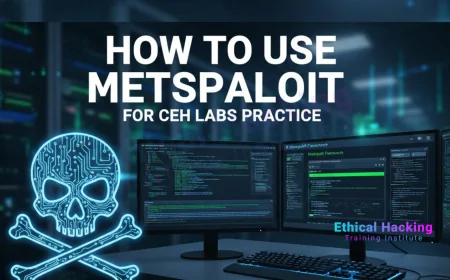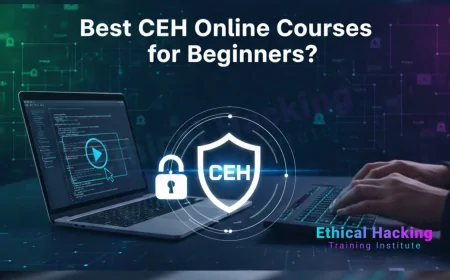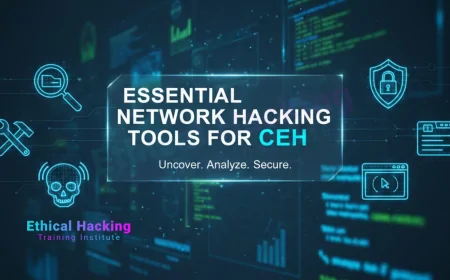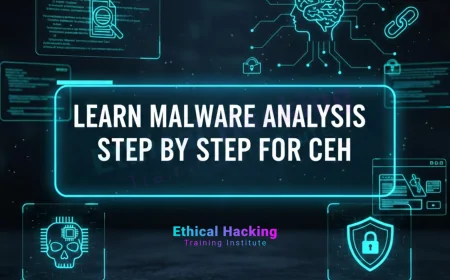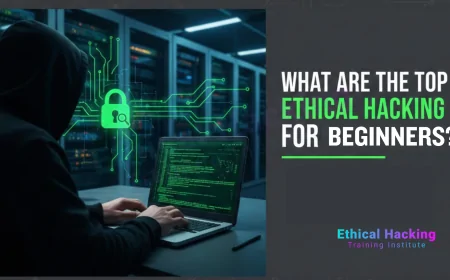What is Ethical Hacking and How You Can Get Started in 2025 | Start Your Ethical Hacking Journey in 2025: Everything You Need to Know
Learn what ethical hacking is and how to start your cybersecurity journey in 2025. Discover tools, certifications, skills, and job opportunities in ethical hacking.
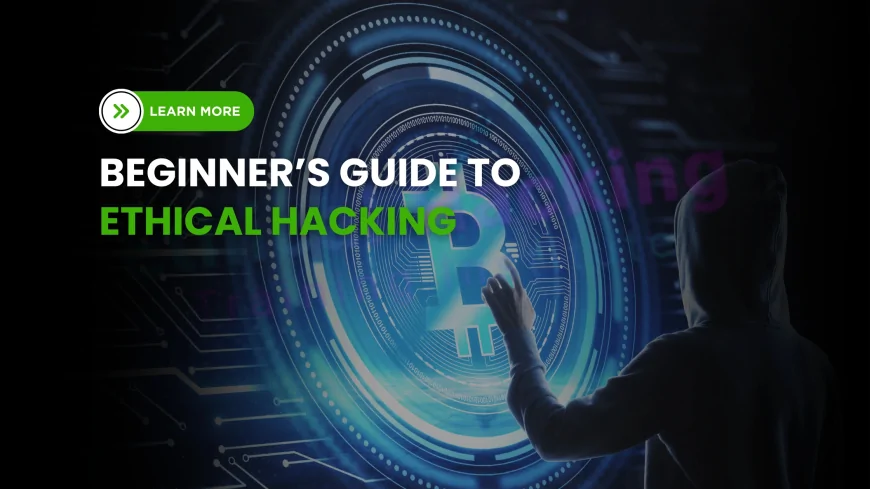
Table of Contents
- Introduction
- What Is Ethical Hacking?
- Why Ethical Hacking Is More Important in 2025
- Ethical Hacker vs. Malicious Hacker
- Different Types of Ethical Hacking
- Legal & Ethical Frameworks to Follow
- Fundamental Skills You’ll Need
- Tools of the Ethical Hacker
- Learning Pathways & Training Options
- Essential Certifications to Start
- Setting Up Your Home/Virtual Hacking Lab
- Hands-On Ethical Hacking Projects
- Getting Your First Ethical Hacking Job
- Staying Ahead in 2025 & Beyond
- Real-World Use Cases & Success Stories
- Top Resources & Communities
- Earning Potential & Career Growth
- Common Mistakes to Avoid
- Frequently Asked Questions (FAQs)
- Conclusion
Introduction
Cybersecurity is front and center in 2025, and with it, the role of the ethical hacker—professionals hired to test and strengthen security—has never been more critical. This guide explains what ethical hacking is, why it matters, and exactly how you can begin a rewarding and secure career in this field today..
What Is Ethical Hacking?
Authorized penetration testing, or ethical hacking, helps organizations proactively identify and fix security gaps. These professionals mimic malicious hackers to discover security weaknesses before bad actors can exploit them. Common tasks include security scans, simulated attacks (penetration testing), and system hardening.
Why Ethical Hacking Is More Important in 2025
-
AI-driven threats: Attackers are using AI in malware and phishing. Ethical hackers are leveraging AI defenders.
-
IoT proliferation: Billions of new network-connected devices need robust testing.
-
Stringent regulations: Laws like GDPR and CCPA demand proactive security audits.
-
Zero-trust models: Organizations are shifting from perimeter-based security to continuous testing and micro-segmentation.
Ethical Hacker vs. Malicious Hacker
| Aspect | Ethical Hacker | Malicious Hacker |
|---|---|---|
| Permission | Always authorized | Unauthorized attacks |
| Intent | Improve and secure systems | Steal data or cause damage |
| Reporting | Documents vulnerabilities found | Exploits in secret for profit |
| Outcome | Fix and strengthen systems | Creates chaos or theft |
Different Types of Ethical Hacking
-
White-box testing – with full systems knowledge
-
Gray-box testing – partial knowledge, simulating insider threats
-
Black-box testing – no knowledge, simulating external breach
-
Web application testing
-
Network penetration
-
IoT and embedded systems testing
-
Wireless and mobile penetration
Legal & Ethical Frameworks to Follow
-
Written authorization (e.g., signed “Rules of Engagement”)
-
Code of Ethics: EC-Council, ISC2, (ISC)² codes
-
Compliance standards: GDPR, HIPAA, PCI-DSS
-
Disclosure policies: Handling vulnerabilities responsibly and privately
Fundamental Skills You’ll Need
-
Operating systems: Linux, Windows, macOS cracker
-
Network knowledge: TCP/IP, packet flows, firewall logic
-
Coding: Python, Bash, PowerShell scripting
-
Web tech: HTTP(S), SQL, JS, REST APIs
-
Cryptography basics
-
Soft skills: Report writing, ethics, client communications
Tools of the Ethical Hacker
-
Port scanning: Nmap, Masscan
-
Vulnerability scanning: Nessus, OpenVAS
-
Web app testing: Burp Suite, OWASP ZAP
-
Wi-Fi tools: Aircrack-ng, Kismet
-
Exploitation frameworks: Metasploit
-
Password testing: Hashcat, John the Ripper
-
Packet analysis: Wireshark, tcpdump
-
Endpoint testing: Cobalt Strike, BloodHound
Learning Pathways & Training Options
-
Self-paced platforms: TryHackMe, Hack The Box, PentesterLab
-
Structured training: CEH, OSCP, eLearnSecurity, SANS
-
Degree-level studies: Universities and cyber schools
-
Hands-on bootcamps: Live cohorts with labs & mentorship
Essential Certifications to Start
-
CompTIA Security+ – foundational cybersecurity
-
CEH (Certified Ethical Hacker) – vendor-neutral test-focused
-
OSCP (Offensive Security Certified Professional) – technical, lab-heavy
-
eJPT / eCPPT – practical entry-level certs
-
Advanced options: OSCE, GPEN, GWAPT, CRTO
Setting Up Your Home/Virtual Hacking Lab
-
Use VirtualBox or VMware
-
Install Kali Linux, Parrot OS for tools
-
Add vulnerable targets: DVWA, OWASP Juice Shop, Metasploitable
-
Capture labs in VM snapshots
-
Extend to cloud: AWS / Azure test environments
Hands-On Ethical Hacking Projects
-
CTF challenges (TryHackMe, VulnHub, HackTheBox)
-
Bug bounties: HackerOne, Bugcrowd
-
Open-source audits: Review small libraries or apps
-
IoT tests: Raspberry Pi, smart home firmware
-
Red team/collab exercises: Coordinate with defenders
Getting Your First Ethical Hacking Job
Network on LinkedIn and GitHub
-
Volunteer or intern in local cybersecurity teams
-
Target foundational roles such as Security Analyst or Junior Pentester to break into the cybersecurity field.
-
Practice behavioral and technical interview questions
Staying Ahead in 2025 & Beyond
-
Learn AI and ML hacking techniques
-
Embrace cloud security and DevSecOps
-
Practice IoT and OT pentesting
-
Specialize in mobile & API hacking
-
Stay current with CVEs and exploit database updates
Real-World Use Cases & Success Stories
-
Company wards off a large ransomware attack using ethical hacking
-
Independent bug bounty hunter makes six-figure payouts
-
OSCP-certified pentester lands high-paying remote roles
Top Resources & Communities
-
Websites: Krebs on Security, Threatpost, Bugtraq
-
Communities: r/netsec, Reddit—TryHackMe Discord
-
Podcasts: Darknet Diaries, Security Now
-
Books: The Web App Hacker’s Handbook, Hacking: The Art of Exploitation
Earning Potential & Career Growth
-
Entry-level: $60k–$90k
-
Mid-level: $90k–$130k
-
Senior & specialist: $130k+
-
Successful ethical hackers on bug bounty platforms can generate substantial income, sometimes exceeding $100K.
Common Mistakes to Avoid
-
Skipping lab work
-
Ignoring soft skills and documentation
-
Operating without legal authorization
-
Narrow skill focus (e.g., web only)
Frequently Asked Questions (FAQs)
1. What is the difference between ethical and malicious hacking?
Ethical hacking is authorized and legal; malicious hacking is illegal and harmful.
2. Do I need a degree to start ethical hacking?
No—but knowledge in networking, OS fundamentals, and certificates help fast-track entry.
3. What certification is best for beginners?
CompTIA Security+ or eJPT are great starting points before moving to CEH or OSCP.
4. Should I study online or in person?
Online is flexible; in-person bootcamps offer structured support. Choose based on your schedule.
5. Is ethical hacking legal?
Yes, with written permission. Don’t hack without authorization.
6. How long does it take to become competent?
With consistent effort—6 to 12 months depending on intensity and background.
7. What lab setup do I need?
At minimum: a VM host (VirtualBox/VMware), Kali Linux, and vulnerable targets.
8. Can I make money from bug bounties?
Yes—skilled individuals can earn anywhere from hundreds to six figures annually.
9. Which tools are essential?
Nmap, Metasploit, Burp Suite, Wireshark, Hashcat, and PowerShell/Bash scripts.
10. Do I need coding skills?
Basic scripting (Python, Bash) is essential. Deeper coding helps with exploits.
11. What is a CTF?
Capture The Flag—gamified challenges designed to practice hacking skills.
12. Is OSCP necessary?
Not essential, but highly valued by employers and recognized globally.
13. How do I find my first job?
Network on LinkedIn, contribute to open-source, apply to internships, show CTF portfolio.
14. How often should I practice?
Daily—consistency matters more than long sessions. Short daily practice is effective.
15. Is remote ethical hacking possible?
Absolutely. Many roles and bug bounty programs are fully remote.
16. What is a pentest report?
A detailed, structured document summarizing discovered vulnerabilities, evidence, risks, and fixes.
17. How do ethical hackers disclose vulnerabilities?
Typically through responsible disclosures, bug bounty programs, or internal channels.
18. What is red teaming?
Simulated adversary engagements testing the organization holistically, not just perimeter defenses.
19. Can beginners join bug bounty platforms?
Yes—start small, focus on public programs with fewer restrictions.
20. What should I study first: tools or theory?
Combine both: learn core concepts, then immediately apply them using tools in a lab.
Conclusion
Ethical hacking in 2025 combines technical mastery, legal awareness, and ongoing learning. The field offers dynamic, rewarding career opportunities—from offense, defense, and research. With a clear pathway, lab-focused study, and community engagement, you can confidently begin your ethical hacking career this year and beyond.
What's Your Reaction?
 Like
0
Like
0
 Dislike
0
Dislike
0
 Love
0
Love
0
 Funny
0
Funny
0
 Angry
0
Angry
0
 Sad
0
Sad
0
 Wow
0
Wow
0






